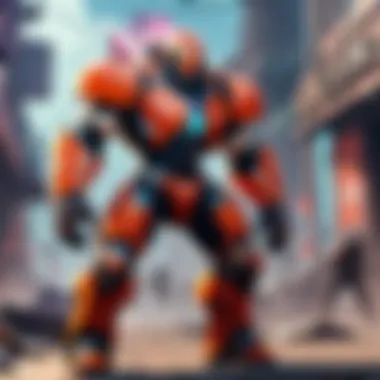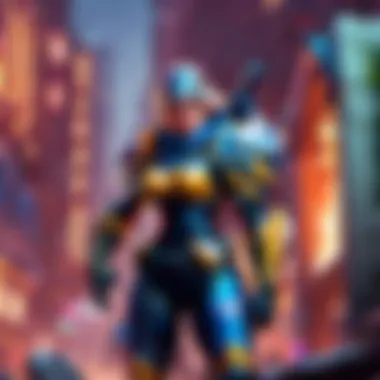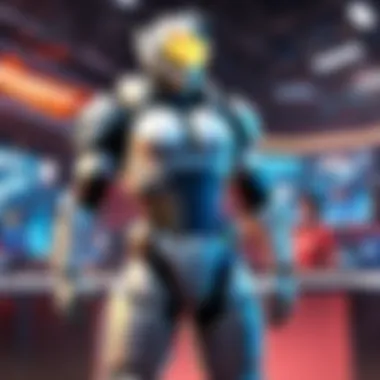Exploring Riot Games: Impact and Innovations in Gaming


Intro
Riot Games has transformed the gaming world since its inception in 2006. Known for their engaging gameplay and innovative designs, they have earned a prominent place within the industry. Their flagship title, Valorant, represents a significant advancement in both shooter and tactical genres.
In this article, we will thoroughly explore Riot's impact on gaming, assessing their innovative measures, community involvement, and the role of Valorant within the esports ecosystem. Through a detailed examination of these aspects, involved peeking into the history of this colossal company, we aim to offer valuable insights for both casual and competitive players.
Game Overview
Prologue to Valorant
Valorant emerged in June 2020 and quickly became a beloved title for shooter enthusiasts. Riot's blend of contextual strategy and instantaneous action resonate with many gamers. The game aims to combine character-based gameplay with traditional shooting principles, offering both uniqueness and accessibility.
Game mechanics and objectives
The primary objective in Valorant usually revolves around either attacking or defending bomb sites in a five versus five player format. Players assume roles as agents, each equipped with unique abilities that support various tactical plays. Understanding how to utilize these abilities effectively is paramount in gaining the upper hand during engagements.
Brief history of the game
Before its release, Valorant started gaining buzz through several closed beta tests. Players quickly noted how it fused elements from previous Riot titles, particularly League of Legends, adapting popular mechanics to make something refreshing in the shooter genre.
List of playable agents and their unique abilities
Valorant fosters a diverse set of characters, each offering a distinctive style of play through a roster of agents. Key agents include:
- Sova: A recon expert that uses advanced abilities for intelligence gathering.
- Jett: Utilizes enhanced mobility to engage enemies and escape dangerous situations.
- Sage: Plays a crucial supportive role able to heal teammates, resurrect fallen allies, and control the field.
- Phoenix: An aggressive dual wielder making use of fiery abilities for damage and self-healing.
Agents add layering to gameplay and encourage collaboration and strategizing among players.
Strategy Guides
Next, understanding strategy greatly enriches the gameplay experience. Utilizing correct tactics gives a distinct advantage over opponents.
Tips for beginners
Starting in Valorant can be intimidating for newcomers. Here are some key points to keep in mind:
- Develop your aiming skills with practice maps.
- Communicate proactively with your team.
- Understand your Agent's abilities and use them purposefully.
Advanced tactics for experienced players
For seasoned players, refinement leads to triumph. Engage in advanced practices like:
- Map control and rotation to outmaneuver rivals.
- Coordinated uses of abilities to synergize with teammates.
- Adapting sneaky plays suited for recon.
Map-specific strategies
Recognizing every map’s challenges can steer players towards prioritizing positions, angles, and bomb site retakes efficiently. Each area has its unique characteristics that require customers to adapt their playstyles.
Agent-specific tactics and playstyles
Choosing an Agent is not merely about color or design; it involves embracing distinct capabilities. Different characters highlight divergent tactics ranging from leadership in combat to defending points strategically. Choose wisely depending on your team's layout.
Patch Updates
Keeping abreast of updates is vital for understanding the game's evolving landscape.
Summary of recent game patches
Recently, patches have included balancing changes to agents, tuning experience points, and optimizing weapon performance. Regular content refresh maintains the vitality of the gameplay.
Analysis of changes to agents, weapons, and maps
The upgrades can determine overall gameplay dynamics. Notable adjustments influence strategies, prompting players to rethink apprehensive play. For instance, if Raze's abilities-significantly changes toggle-wide adjusts other player interactions drastically too.
Community feedback on patch notes
Analyzing community critique around patch notes indicates how the player base responds to alterations. Engagement from various forums such as reddit.com allows more dialogue emerged.
Predictions for upcoming updates


Speculations regarding forthcoming updates eagerly shape community discussions. Players keenly explore trends regarding the potential addition of new agents or maps to surprise challengers.
Esports Coverage
The esports inclusion of Valorant garners substantial attention.
Overview of recent Valorant esports events
As press continues talking about emerging competitions recently attaching major arenas, many aspirants flock to these opinions, watching teams engaging at high intensity. There have been significant tournaments hosted, showcasing the competitive level further expands` s.
Tournament predictions and analysis
Experts are piecing together insights valid for unpredictability throughout these thrilling sessions계를.p. Variety events exhibit selected factors defining aggressor playing, propelling events through nailbiting rounds
Insights on current professional meta
Studying professional performances brings further evolution; upcoming strategies emerge through informal chats reflecting vital components the meta adapts going edited accordingly within demands of audience j.
Player Community
Featured player highlights
In agreeable scenarios, community diversification sees particular players pushing lifetime achievements or exposing potential clefts emerging professionals.
Community-created content showcase
Diverse creative endeavors provide alternatives how-avatar-engaged (meet others' agents) engaging the player fan spectrum.
Forum spotlight on trending topics
Recent conversations broach healthily through audible mixes indicates shared logs providing substantiatard heads skim through immense channels원이.
Riot Games, having shaped the gaming landscape with discussion-ready consistency can excite and meet massive aspirations gathered’heard in community scope and endeavors really unveiling a captivating insight regarding impressions cultivated.'
Overview of Riot Games
Riot Games has become a key player in the video gaming industry since its establishment. Understanding its inception and growth is essential to grasping the significance of its projects and the innovation it brings to the tabletop. At the core, Riot has not just created games; it has built an ecosystem of engagement, loyalty, and incredible fan communities.
Founding and Early Years
Riot Games was founded in 2006 by Marc Merril and Brandon Beck. Their vision was clear: develop games that players truly admired. The first big success came in 2009 with League of Legends. This title cemented Riot Games' legacy in esports and gaming culture. From the start, they encouraged community feedback and integrated players' suggestions into the game's development lifecycle.
Rise to Prominence
The rise to prominence for Riot Games is primarily tied to League of Legends, which became a cultural phenomenon. Engaging both casual and competitive players, it attracted millions worldwide. The balancing efforts and regular updates emphasized the company’s commitment to retaining relevance in a highly competitive market. Riot reshaped how games evolve through community engagement and updates genuinely reflective of player input.
Current Game Portfolio
Today, Riot Games has expanded beyond its flagship title. Each game reflects their innovative spirit and dedication to quality.
League of Legends
League of Legends remains a critical part of Riot’s portfolio. It is not only a complex strategy game but a social environment where players can connect. Its competitiveness attracts players looking for a challenge. The sheer depth of this game—especially with character versatility—makes it a staple in gaming.
Valorant
Another standout title is Valorant, introduced in 2020. It combines tactics with the shooter genre, offering a refreshing perspective. Valorant emphasizes team strategy over individual performance., leading to a new focus in the community. This title shows what teamwork denotes in high-stakes scenarios. Its unique character system provides diverse gameplay that attracts players seeking variety in their experience.
Other Titles
Aside from these prominent titles, Riot Games has ventured into various formats, showcasing its territorial innovations. Meaningful expansions to the League of Legends lore through multiple media illustrate its storytelling prowess. Titles like Teamfight Tactics and Legends of Runeterra enrich the company’s portfolio without overwhelming it. These games focus on strategic elements as well, aimed at creating unique experiences either on mobile devices or desktops.
Understanding the unique contributions of these titles helps provide insight into Riot Games' ongoing legacy within the gaming landscape.
The Impact of Valorant
Valorant, developed by Riot Games, has signalized a notable shift in the landscape of tactical shooters. This section explores its significance within the gaming sector, particularly its unique mechanics, design features, necessity for strategic gameplay, and overall influence on player engagement in both casual and competitive loops. With its launch in 2020, Valorant rapidly cultivated a strong community, reassuring gamers long frustrated with the direction of existing tactical shooters. As a linchpin in Riot's portfolio, Valorant meets specific demands and expectations of players seeking a combination of strategy, teamwork, and skill-driven gameplay.
Game Mechanics and Design Features
Valorant is not just another bullet-puller. It blends traditional first-person shooter mechanics with hero-based elements. Players choose agents, each with distinct abilities. These abilities are strategic tools, transforming typical gunplay into a coordinated effort. Every match requires players to think in real-time, deciding when to attack or play defensively based on their agent's abilities.


The duality of gunplay and ability usage propels each match's pace and dynamism. The maps in Valorant promote variety in strategies. Designers invested time creating intricate level layouts that encourage innovative tactics. Moreover, the emphasis on unobtrusive movement mechanics enhances smooth gameplay. This active engagement from mechanics highlights how game design can directly impact a player’s experience.
Comparison to Other Tactical Shooters
Valorant draws direct parallels and contrasts with classics like Counter-Strike: Global Offensive and Overwatch. While CS:GO focuses strictly on high-stakes situations with limited superpowers, Valorant presents an alternative by embracing player agency through varied character abilities. This offers players the challenge of systematically integrating both cosmic abilities and structured gunplay.
The infusion of character abilities sets Valorant apart, catering to players fed up with older titles' stagnation. Regardless of configurations or shooting skill, Valorant encourages creative expression, thereby wising tactical depth. Eloquently blending these elements allows Valorant to carve out a definitive niche without entirely alienating fans of traditional gameplay.
Community Feedback and Reception
User feedback has been pivotal in shaping Valorant's development. Initially, players were cautious. Concerns about character-driven content taking precedence over combat eventually vaporized. Advanced matchmaking systems reduce bottlenecks found in past games, allowing players to find audience also hostile quickly.
Response upon launching Valorant was significant, leading to high player counts rather rapidly. Various users commenting on platforms like Reddit and FB hailed developers for responsive updates covering bugs or balancing issues. This open communication demonstrates Riot's dedication to community-oriented engagement, echoing a commitment yes seen in League of Legends.
As a product embedded deeply intertwined with its community, Valorant transcends gaming limits, establishing a unique bond between developers and players. Overall, this engagement forges a sustainable retention strategy, reminding other game producers of the value derived from collaboration with their audience.
Riot's Approach to Game Development
Riot Games has adopted a distinct approach to game development that reflects its commitment to creativity and player satisfaction. This methodology combines thorough research, player feedback, and a perpetual cycle of refinements and innovations. The approach ensures that Riot doesn't just create games but rather invests in experiences that resonate with both casual and competitive gamers.
Iterative Design and Player Involvement
At the core of Riot’s development philosophy is iterative design. This means developing games in cycles where feedback and testing are highly prized. During several phases, players are invited to contribute their thoughts on gameplay mechanics, balance, and new features. This involvement helps to refine the game far before its public release.
Players often experience early versions of games, known as betas. Feedback collected during these periods shapes the final product. Riot consistently emphasizes community voices. Doing so assures that gameplay reflects the desires and diverse expectations of its extensive audience.
An example can be seen with Valorant. Its developers constantly make adjustments based on the insights shared in player forums and social media platforms like reddit.com.
Balancing Competitive Play
Riot Games believes balance is key when it comes to competitive gaming. For instance, League of Legends faces scrutiny regarding hero abilities, cooldown times, and even resource cost. Riot strikes a balance between creating a unique hero identity while ensuring no single character dominates the competition.
The developers monitor live game data, scrutinizing matches in real time to maintain fairness. Backlash often arises in eSports if imbalances persist. Riot addresses these concerns rapidly through patches and updates.
Such attentive practices reshape how players approach competitive arenas, cultivating an environment where strategy and skill prevail against overpowering characters.
Updates and Seasonal Content
Regular updates serve as the lifeblood of any live game, and Riot’s consistent delivery of seasonal content showcases this commitment. Major updates not only adjust gameplay balances but also introduce new features. They might introduce new maps, game modes, or characters every few months.
Holidays and changing seasons bring special events, further adding excitement. For example, the LoL World Championship and the Valorant Champions Tour are highly anticipated community milestones. They guide conversations besides enhancing loyal players' investments.
These updates not only sustain interest but sway perceptions of the game's longevity. As a result, it creates an ecosystem where players continuously re-engage, preserving a robust and vibrant community.
Esports Ecosystem Surrounding Riot Games
The esports ecosystem around Riot Games stands as a testament to the evolving relationship between game developers and competitive gaming. Riot has effectively shaped the landscape of esports, leaving a lasting imprint on how games are played, viewed, and monetized around the globe. This section delves into the multifaceted roles Riot Games plays in this ecosystem, examining critical elements that underline its significance.
Riot's Role in Competitive Gaming
Riot Games has established itself as a leader in the realm of competitive gaming. By centralizing their major titles around esports frameworks, they have fully integrated competition into player experience. One of the key features of this role is the development of organized leagues, particularly for.
- League of Legends, which boasts a highly structured league, including the League of Legends Championship Series (LCS) and other regional leagues.
- Valorant, which is making waves with various tournaments ahead of its formal esports system.
This structured approach engenders not only professional play but contributes greatly to community involvement and growth of a passionate fanbase.
Major Tournaments and Events
The importance of tournaments in the Riot Games ecosystem cannot be overstated. Major events collaborate community interests, recreational players, and viewers in an exciting manner. Notable tournaments include:
- World Championship for League of Legends
- VALORANT Champions Tour
These tournaments not only elevate player prestige but also foster significant funding opportunities through sponsorships and broadcasting rights. This financial reinforcement boosts franchises and encourages a higher level of professionalism within the gaming industry.
Factors Driving Engagement
- Prize Pools: Increased financial incentives keep players motivated to perform at the highest level.
- Multi-Platform Broadcasts: Availability across different channels engages wider audiences.
- Professional Networking Opportunities: Players and organizations rely on these events to forge valuable connections in the industry.
Support for Professional Teams and Players


Riot Games exhibits substantial commitment toward professional teams and players, reinforcing its dedication to the esports ecosystem. This support manifests in various forms such as:
- Providing financial backing through direct sponsorships solutions for teams.
- Organizing bootcamps, which prepare professional players through rigorous training and development environments.
- Offering structured,on-going feedback loops via patches and updates, directly collaborating with esports athletes to adjust game balance and mechanics.
This solid backing promotes a robust competitive spirit and operational sustainability, critical to the lasting health of professional play.
“Riot has transformed not just their titles, but the perception of gaming itself - Detailed frameworks now exist where players aspire and viewers partake, creating interplay between casual and competitive spectrums.”
By intricately weaving professional development into its operations, Riot Games not only progresses its titles but also uplifts the entire esports ecosystem and the communities it nurtures.
Community Engagement and Content Creation
Community engagement plays a pivotal role in the success of Riot Games. This approach focuses on building relationships with players, creators, and the wider gaming community. Engaging directly with users has brought various benefits. These include a robust fanbase, continuous feedback loops, and enriched content that resonates with players.
Effective community engagement helps in fostering loyalty and trust among the player base. When players feel involved, they are more likely to support the game and the brand itself. Furthermore, insights gained from community interactions can directly inform game design decisions, enhancing players' experience. As such, Riot Games places high emphasis on creating channels for communication and feedback.
Fostering a Healthy Community Environment
Creating a supportive space for players is crucial. Riot Games aims to establish guidelines that nurture respect and acceptance within the community. By promoting positive interactions, Riot can minimize toxicity, which often plagues online gaming environments.
Key strategies include:
- Monitoring player interactions and enforcing community rules
- Implementing reporting systems for harmful behavior
- Offering support and resources to players in need
The intention is not only to secure a pleasant gaming experience but also to ensure long-term player retention. A healthy community attracts new players while keeping current ones engaged and satisfied.
Streamers and Influencers
Influencers and streamers play substantial roles in promoting Riot Games across platforms. Their ability to reach vast audiences through live streams and social media makes them valuable ambassadors for the brand.
Strengths of engaging with content creators:
- Raising awareness of titles like League of Legends and Valorant
- Showcasing gameplay and strategies, which can enhance player skills
- Providing platforms for community discussions and feedback
Twitch and YouTube are particularly important where interactive content provides an avenue for casual gamers and competitive players alike. Engaging with influencers also promotes incentive for players to participate in community activities.
User-Generated Content and Fan Engagement
User-generated content serves as a testimony to the community's passion for Riot Games. This content comes in various forms, including fan art, game mods, and cinematic experiences created by enthusiasts.
Riot actively facilitates this creativity by:
- Hosting fan contests and tournaments
- Recognizing and showcasing outstanding works in official channels
- Creating transparency around intellectual property policies to nurture creativity
Engaging with user-generated content can significantly enhance players' connection to the game and each other. When fans contribute their talents and creativity, it enriches the gaming environment and creates shared experiences.
_
The Future of Riot Games
The importance of examining the future of Riot Games cannot be understated. As a pioneer in the gaming industry, Riot has continually shaped how games are developed, marketed, and sustained through community involvement. Looking forward, it is imperative to consider the technologies that emerge, the predictions revolving around upcoming titles, and the approaches needed to maintain community trust and loyalty. Each of these elements not only defines Riot's next steps but also influences the broader context of the gaming industry.
Emerging Technologies in Gaming
The gaming industry is poised for continued evolution, largely driven by emerging technologies. Riot Games must leverage advancements like artificial intelligence, cloud gaming, and virtual reality to stay competitive.
- Artificial Intelligence: It could streamline game-design processes, specifically in testing and balancing. AI can analyze player habits, potentially leading to personalized experiences.
- Cloud Gaming: This technology allows players to enjoy games without robust hardware, broadening the audience reach. Riot can tap into this to expand its user base for games like League of Legends and Valorant.
- Virtual Reality: Integrating VR could introduce immersive gameplay dynamics and create new engagement opportunities. Riot would do well to explore user experiences in a more profound way through this technology.
Investing in these areas can provide Riot with various avenues for innovation and player retention.
Predictions for Upcoming Titles
As Riot Games looks ahead, the anticipation for new titles continues to grow. Given the successful formula of Teamfight Tactics and the ongoing development of games like Project L, we can expect a few major trends.
- Cross-Platform Capability: Emerging titles will likely build on the foundation of cross-play, reflecting a core demand from players who want flexibility.
- Expanding the Universe: Innovations will also hinge on deepening the lore and character depth as seen in existing titles.
- Integration of Story: Upcoming games might place a stronger emphasis on narrative, blending engaging stories with the gameplay mechanics.
Listening to the community will be vital as these speculative titles are designed. Understanding their preferences and desires shapes Riot's development cycle.
Sustaining Community Trust and Loyalty
Riot Games has established itself through strong engagement with its player base. Going forward, it is crucial to maintain a transparent dialogue that fosters trust and nurturing loyalty.
- Regular Updates and Communication: Clear updates about game balance, features, and bug fixes keep players informed and valued.
- Incorporation of Feedback: Demonstrating responsiveness to community concerns translates into stronger player retention. Regularly collected feedback should shape updates and future projects.
- Fair Treatment in Competitions: To sustain loyalty, it’s important that players feel respected in competitive settings. Supporting a fair play environment assures the community of EFurtitative measures if issues arise.
Sustaining community trust is not merely an option; it is an essential strategy for lasting success.
As Riot navigates its path forward, being attuned to emerging technologies and fan expectations will be vital for its ongoing relevance. The future outcomes for Riot rely significantly on building trust while delivering innovative gaming experiences.



